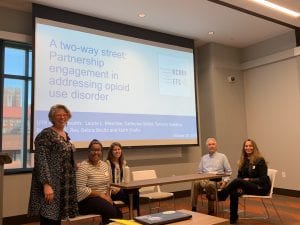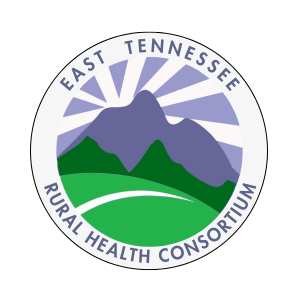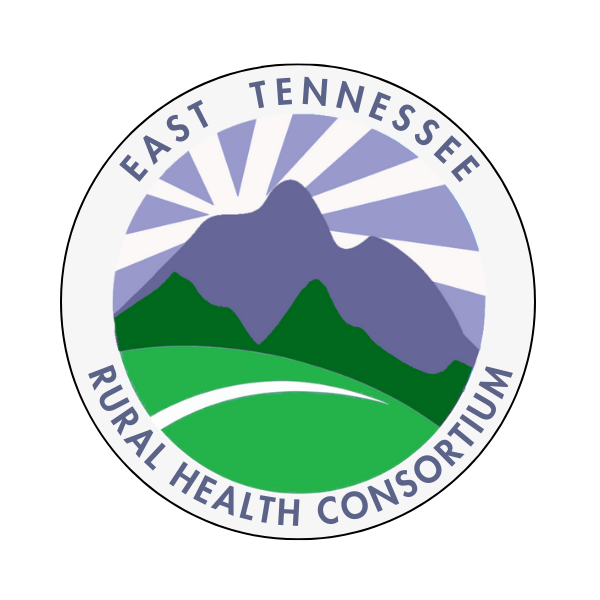SBIRT Training: Medical Billing and Coding
Facilitator: Dr. Brian Winbigler, Assistant Professor, University of Tennessee Health Science Center
Trauma Informed Care Training
Facilitator: Dr. Brian Winbigler, Assistant Professor, University of Tennessee Health Science Center
Other Education Materials and Evaluations
 East Tennessee Rural Health Consortium and Project HOPE regularly offer training and education events aimed at strengthening the prevention, treatment, and recovery resources for substance use disorders in our 10-county target region. Included below are descriptions, training materials, and evaluation reports for some of our events.
East Tennessee Rural Health Consortium and Project HOPE regularly offer training and education events aimed at strengthening the prevention, treatment, and recovery resources for substance use disorders in our 10-county target region. Included below are descriptions, training materials, and evaluation reports for some of our events.
Substance Use Disorder 101
The Substance Use Disorder 101 training was held on December 11, 2020 and provided participants with an overview of substance use disorder including brain mechanisms, various drug classifications, and problems associated with SUD. Participants reviewed data and prevention strategies specific to opioid use disorder. View the PowerPoint and ratings of the training.
Substance Use Disorder and the Brain
This training provides participants with an overview of why we treat substance use disorder (SUD) as a disease, and how the brain is affected by substance use disorder, both chemically and physically. Participants will also learn the various ways to treat SUD and how to reduce stigma around treatment, prevention, and recovery.
Anti-Stigma Training Series
In summer and fall 2020, Project HOPE held a two-part anti-stigma training series. The first session covered topics including addressing stigma against people who use drugs, overcoming SUD stigma in faith communities, addressing adverse childhood experiences, and addressing stigma in treatment and recovery spaces. The second session discussed the different pathways of recovery from the perspective of practitioners and patients. View Session 1 Training Materials and Session 2 Training Materials.
In April 2021, Project HOPE held an RCORP-ETC meeting and training on Disparities and Stigma Related to Substance Use Disorder. Dr. Peter Jackson at the University of Vermont, Larner College of Medicine was invited to present. View Part 1 Training Materials and Part 2 Training Materials, Training Recording, and ratings of the training.
You Gotta Have Faith: Pathways from Prevention to Recovery
In July 2021, Project HOPE held an RCORP-ETC meeting and training on faith-based organizations’ initiatives and recovery congregations related to Substance Use Disorder. Faith leaders and people in recovery shared their East Tennessee experience and insights about the role of the faith community in prevention, treatment, and recovery. Eric Landry, the Faith-Based Community Coordinator for East Tennessee’s Grand Division provided an introduction. The panelists included: Kyle Prichard, Marta Cogburn, Debra Shultz, Elora Prichard, Dawn Radics, and Ron Stephens. Please view the PowerPoint, recording, and ratings of the training.
Substance Use Disorders: Charting a Path to Health Equity
On Oct 22, 2021, Project HOPE held an RCORP-ETC meeting and training titled Substance Use Disorders: Charting a Path to Health Equity. Dr. Lesly-Marie Buer, the Research Director at Choice Health Network Harm Reduction provided a keynote speech. The panelists included: Campbell County Mayor E.L. Morton, Tennessee State Court Judge Duane Slone, TennCare Associate Medical Director Dr. Jona Bandyopadhyay, and Brittany Hudson. The event had discussions on health inequities and stigma faced by people with a substance use disorder, and innovative practices and policies to reduce systemic health inequities and stigma. Please view recording 1 on the keynote speech, recording 2 on the panel discussion, rating, and the notes on actionable opportunities and possible policy solutions.
Rural Kinship Care in the Opioid Crisis
Project HOPE and RCORP-ETC held a consortium meeting and training on Rural Kinship Care in the Opioid Crisis on January 21, 2022. Heath Cook and April Snell at the University of Tennessee, Knoxville introduced status of kinship care, meaning for young people and families, and stigma and services for kinship families. The panelists included: Brittany Rosette-Jones, Mitch Olszewski, Tracy Van de Vate, Aisha Abu-Asaba, and Carran Broadnax. Please view recording 1, recording 2, PowerPoints, resources, and rating of the training.
Opioid Use Disorder and the Health of Women and Children
On April 22, 2022, Project HOPE and NOW hosted an online consortium training on Opioid Use Disorder and the Health of Women and Children. The event was opened with an overview by Laurie Meschke, PhD of the University of Tennessee, Knoxville. This was followed by a panel discussion on infancy and childhood after prenatal opioid exposure with Kyle Cook, NNP from East Tennessee Children’s Hospital and Melinda McCartt, PhD from Oneida Special School District. A final presentation was by Dr. Jona Bandyophadhya from TennCare, who addressed reproductive health for women with opioid use disorder. Please view recording 1, recording 2, and rating of the training.
Empowerment in Youth Programming Evaluation
Online Programming for Early Adolescents Evaluation
Ages and Stages Training Series Evaluation
Recruitment for Youth Programs Evaluation
Real Tools for Real Challenges Evaluation
Brain Development, Trauma, and Resilience for Young People Evaluation
Ratings 1, rating 2, and rating 3
Adolescence and COVID-19

